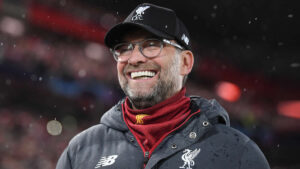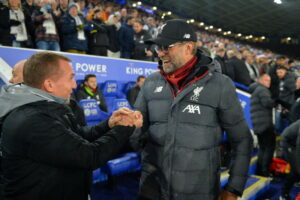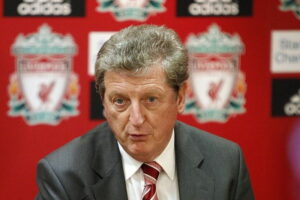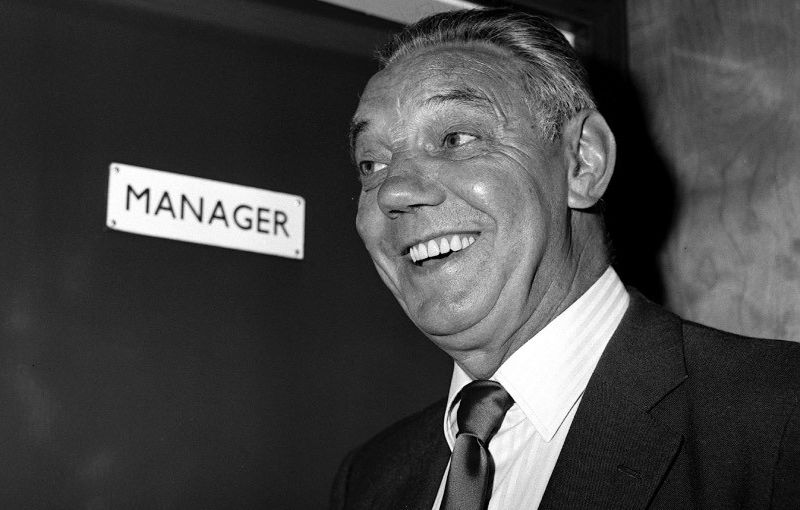
Given the wealth of successful managers that have taken charge of Liverpool Football Club over the years, there is an extent to which Joe Fagan is the forgotten man of Anfield. At pretty much any other club, with the exception of Manchester United, he would go down as the most successful manager that they’d had, but at Liverpool he barely even makes it into the top five in terms of trophies won.
Perhaps it is a combination of his short amount of time at the club and the quiet, unassuming nature of the person that means that he doesn’t get the same level of respect as others.
Smokin’ Joe Fagan was born on this day in 1921.
Liverpool Legend ❤️ pic.twitter.com/d5c8fHlNVK
— The Anfield Wrap (@TheAnfieldWrap) March 12, 2023
There is no question that he is deserving of respect, though. Imagine becoming the manager of the club from the city where you’re born and leading them not only to the top-flight league title but also making them European champions in the same year? That is precisely what Joe Fagan managed, with a League Cup thrown in there for good measure. Little wonder, then, that he ended that 1983-1984 campaign as the English Manager of the Year.
A member of the famed Liverpool boot room, Fagan kept success ticking over in the wake of Bob Paisley’s retirement and will forever be a Liverpool legend.
The Early Years
Born Joseph Francis Fagan in Walton, Liverpool, on the 12th of March 1921, Fagan spent his youth living in the Litherland and Scotland Road areas of the city. His parents, Patrick and Mary, were both of Irish descent and his father was thought of as being something of a ‘dubious’ character.
Absent for long periods, Fagan owed his happy childhood to his mother and the fact that he lived so close to both Anfield and Goodison Park meant that he was always likely to get into football once he was older. As a 14-year-old he captained his school side to the Daily Dispatch Trophy.
He left school in 1937 and signed for Earlestown Bohemians, a St Helens-based club who played their matches in the Liverpool County Combination. It was a strong amateur league, with sides representing both Liverpool and Everton playing in it. As a result, he was invited on a trial for the Anfield side, with the manager at the time. George Kay, offering him a contract.
Fagan, however, decided that his chances of making it into the Liverpool first-team would be limited, so he turned the contract offer down. Instead, he signed for Manchester City on the eighth of October 1938.
Fagan’s Time During the War
As a player, Fagan was a right-half and during the 1938-1939 season he progressed through the Manchester City setup in the position. Just as he was challenging for a first-team place in the 1939-1940 campaign, the Second World War broke out.
With the Football League suspended for the duration of the conflict and Fagan not initially allowed to join the war effort because of his age, City allowed him to keep up his fitness by playing for Cheshire County League side Hyde United. He played for them 26 times, earning good press in the local papers before returning to play for City.
Regionalised games were tentatively being allowed to be played during the 1940-1941 campaign, seeing Fagan make his debut in one such game against Everton. Four more matches were played before he became eligible for military duty, with Fagan joining the Royal Navy only to discover that he suffered from sea sickness.
He was sent to Egypt in order to operate as a telegraphist with a flotilla responsible for minesweeping, remaining there until 1946. A good boxer, he took part in an number of bouts whilst with the navy until he ended up getting his nose broken in one of them.
Getting Back to the Football
Having occasionally played for City in regionalised matches during the war when he was on leave, Fagan hoped to establish himself in the Man City side. This happened after a change of manager saw former captain Sam Cowan given the hot-seat, with Cowan giving Fagan his official debut for the club more than eight years after he’d been signed. It came in a 4-0 win over Fulham, with Fagan playing well. He went on to make 121 consecutive league appearances, helping the club gain promotion out of the Second Division and becoming a popular figure at the club.
Boasting a strong work ethic and a loyalty to the cause, he ended up being on the opposite team to Bob Paisley when City beat Liverpool 2-0 at Maine Road. He continued to be an important part of the City team until he broke his leg in 1951. At the age of 30, he realised that he had to start thinking about his future and chose to leave City in order to become a coach.
That happened at Nelson in the Lancashire Combination when he was player-manager, leading the club to the league title in his first full season in the manager’s position. He briefly played for both Bradford Park Avenue and Altrincham before retiring as a player completely.
Moving to Liverpool
In 1954, Harry Catterick, the Rochdale manager, brought Fagan on board as his assistant manager. Amongst his duties, Fagan had to do the laundry and mark the pitches as Spotland, remaining at the club until 1958. It was that point that he was approached by the Liverpool manager of the time, Phil Taylor, to become a coach after Catterick had recommended him for the role.
He and his family moved into a semi-detached house close to Anfield, where they would remain for the rest of his life, even after being offered a bigger house by the football club.
Melwood, July, 1971. Shankly agreed a new contract & #LFC announced a back room shuffle. Bob Paisley, became assistant manager; Joe Fagan, 1st team trainer; Ronnie Moran, 2nd team trainer; Reuben Bennett, special duties; and Tom Saunders, youth trainer. #thisismelwood pic.twitter.com/aoIVT0TKNu
— This Is Melwood (@ThisIsMelwood) January 9, 2023
In December of 1959 the future of Liverpool Football Club was changed forever when Bill Shankly was given the manager’s role. Having tried to sign Fagan as a player when he was the Grimsby Town manager, Fagan was delighted to discover that he was a coach at Anfield. On his first day, Shankly held a meeting with Bob Paisley, Reuben Bennett and Joe Fagan, the Liverpool coaches at the time, to tell them that he wanted to work with them and that Fagan was to become the reserve team coach. They would, Shankly said, have to work with absolutely loyalty to each other and to the club.
An insight into the Reds training where players (and Reds fan Lol Cotterell) are put thro their paces by an unrelenting Joe Fagan prior to Tommy Smiths testimonial in 1977. pic.twitter.com/Yi1XfWRUDa
— Davolaa (@Davolaar) August 5, 2023
Shankly wanted to introduce methods that would see the players use the ball, which delighted Fagan who had worked like that at Nelson. Paisley, a trained physiotherapist, believed that players needed to cool down after training, believing that 40 minutes was required before having a bath or shower.
Fagan suggested that they get the bus from Anfield to Melwood, the club’s training complex, before training and then again afterwards, which would be used as a cooling down period. It worked, with the 1965-1966 period seeing Liverpool use just 14 players on their way to the title and the European Cup Winners’ Cup final.
Creating the Boot Room
Shankly wanted to make the reserve team into a ‘kindergarten for future stars’, with Fagan working with the likes of Roger Hunt, Tommy Smith and Ian Callaghan on their war to becoming first-team players. Fagan would often coach the local brewery’s team in his time away from Melwood and they would given him crates of Guinness to say thank you. Having taken delivery of them and knowing of no better place to store them, Fagan began to store them in the same room as the football boots. The presence of alcohol meant that it was an obvious place for the staff to meet.
ON THE WAY TO A GAME. Liverpool manager Bill Shankly with his back room boys Bob Paisley, Reuben Bennett and Joe Fagan in 1964. With these men aboard Liverpool were heading for silverware and no one was going to stop them! #Liverpool #LFC♥️🏆❤️ pic.twitter.com/JA56dYHAhn
— “YNWA” The Story of Liverpool FC (@LFCHistoryShow) June 28, 2023
Shankly held daily meetings with his coaches to discuss tactics, ideas for training and how they thought the players were getting on. The fact that the meetings took place there meant that boot room became the central location of the Liverpool brain’s trust, going on to be one of the most famous rooms in the world of football.
In 1971 Shankly decided to promoted Fagan to the role of first-team coach, which remained his role in the wake of the Scot’s retirement in 1974 and the promotion of Bob Paisley into the manager’s role. The one-time on-field adversaries were now firm friends.
Becoming Liverpool Manager
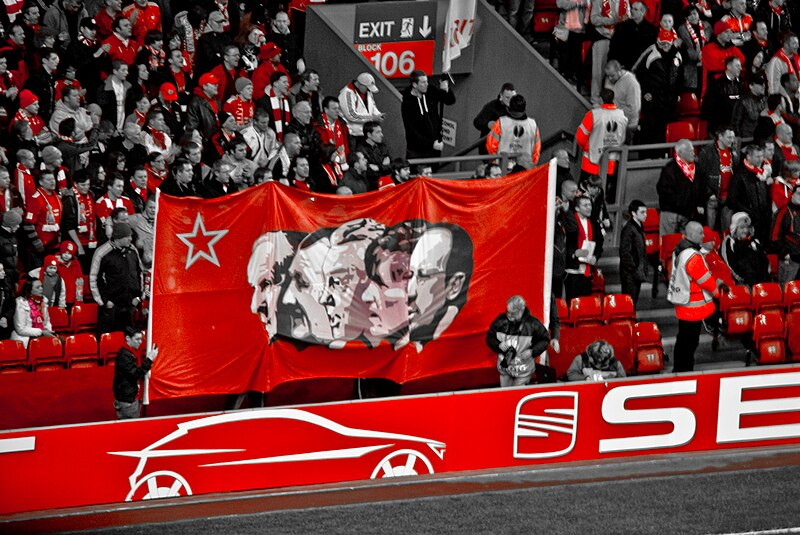
In 1979, Paisley made the decision to promote Fagan to the role of his assistant manager. The fact that Bobby Robson would call him one of the best coaches in the game tells you everything you need to know about how respected the quiet and unassuming Scouser was and if he was going to learn from anyone then the most successful manager in the history of the game in Paisley was certainly the person to learn from. When Paisley announced his retirement in 1983, it seemed clear to everyone that Fagan was the obvious choice to replace him in the hot-seat.
Joe Fagan took charge of his first League game on this day in 1983. The Reds travelled to Molineux and drew 1-1 with Wolverhampton. Wolves took an early lead thanks to a penalty from Geoffrey Palmer, Ian Rush responded with a goal for #LFC in the 46th minute. pic.twitter.com/8rFSWpg9CM
— LFChistory.net (@LFChistory) August 27, 2023
Fagan, as with Paisley before him, was reluctant to take on the role. In some ways, it was something of a poisoned chalice; the team Paisley had left him was so good that he couldn’t fail, but if he did anything other than win then it would be seen as an unmitigated disaster. Aged 62 at the time of the appointment, it was clear that he was going to be a short-team solution to the management problem as Liverpool waited for the likes of Phil Neal or Kenny Dalglish to become old enough to take on the manager’s role themselves. He was officially appointed to the role on the 1st of July 1983.
Though something of a laconic figure, it would be untrue to suggest that Fagan was a soft-touch. On Boxing Day of 1981, Liverpool lost 3-1 at home to Manchester City, leaving them 12th in the league. Fagan, as assistant manager, sat the players down and went through the team one by one, telling everyone where they needed to improve. He said, “We’ve had more meetings in the last month at this club than I’ve had in 17 years…You’re all playing like individuals, start playing as a team. I’m not having another meeting from now ’till the end of the season”. Liverpool went on to win the league.
Such was the ability of the Liverpool team that he inherited that his biggest concern was complacency. The side had won the league the previous season in spite of the fact that it had lost five of its final seven games, drawing the other two. The good news was that the players liked him and accepted his rise to the number one spot, with Souness in particular a fan of his and drumming into the other players that they needed to win for him. They did just that, defending the First Division title as well as making it to the European Cup final to face Roma at the Olympic Stadium in Rome.
Remember Joe Fagan was the first English Manager to win the treble in 1983-84 season. pic.twitter.com/G3x5o2pQNU
— David McGrady (@Djmc76) June 17, 2023
It was there that Fagan proved his ability as a manager and psychologist. Neal gave Liverpool the lead in the final before Roberto Pruzzo just before the half-time whistle. The match ended that way and no more goals came in extra-time, meaning that the Reds had to beat Roma in front of a partisan crowd in their home stadium. Fagan spoke to his players and said that, win or lose, they should be incredibly proud of their season and he didn’t care what happened next. He took the pressure of them and, thanks to Bruce Grobbelaar’s jelly legs, they won the penalty shootout.
Fagan Retires
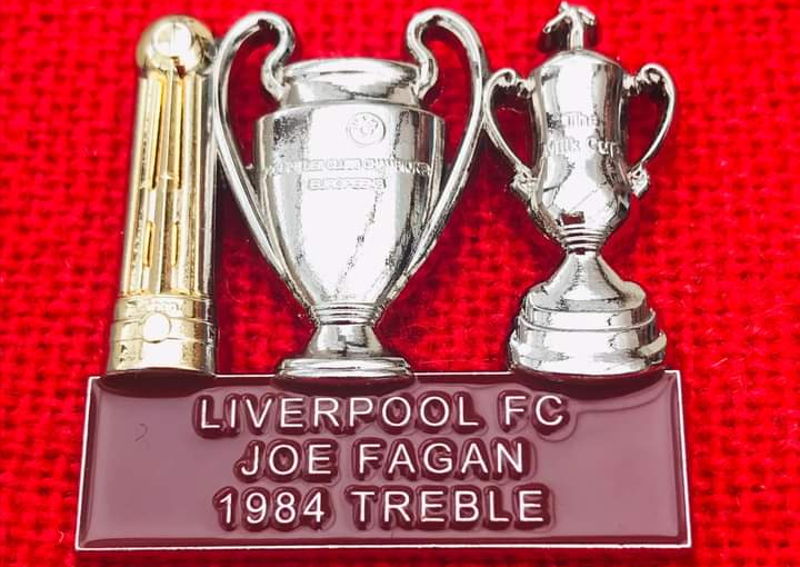
The fact that Liverpool had already won what was then known as the Milk Cup meant that he became the first English manager to win a treble, whilst the European Cup win saw him become the last English manager to win the famous trophy. It was also the last season for Graeme Souness as a Liverpool player, leaving the club to join Sampdoria for the 1984-1985 campaign.
With Kenny Dalglish struggling with injury and other players not performing, the Reds struggled in the league and ended up missing out on the title to Howard Kendall’s Everton side.
The wonderful Joe Fagan in 1984 interviewed after @LFC had won yet another League title. What a magnificent, humble man.
— When Football Was Better (@FootballInT80s) January 18, 2023
Liverpool did reach another European Cup final, however. Sadly, though, it was to end in disaster when a group of Liverpool supporters charged mostly Italian and Belgian supporters, who were crushed by a collapsing wall. There were 39 deaths and hundreds of injuries in one of the darkest days of the club’s history.
Fagan had already told his players before kick-off that, moving forward, they should call him ‘Joe’ rather than ‘boss’ as he was going to retire. The match itself was something of an after-thought for all concerned and Juventus won it 1-0, with English clubs then being banned from European football for five years.
Life After Football
A motorcar enthusiast away from the football, Fagan left the sport behind after his retirement and returned to living in the semi-detached house that he and his wife Lillian had shared with their six children. He became a mentor for Roy Evans after he was given the Liverpool manager’s job in the mid-1990s. As the decade went on, Fagan battled cancer and eventually succumbed to the disease on the 30th of June 2001. He died in the same week as Billy Liddell and Tom Saunders, which perhaps reflected the fact that he was a manager who came after Shankly and Paisley and before Daglish.
Remember a true Bootroom great, Joe Fagan, who sadly passed away on this day in 2001 ❤️ pic.twitter.com/WQwGRw7HCK
— Liverpool FC (@LFC) June 30, 2023
He was never really one of the spotlight and originally took the Liverpool manager’s job because he was worried that if he didn’t then someone from the outside might come in and the other coaches’ jobs would be threatened. His funeral procession saw people from both sides of the Merseyside footballing divide lining the streets to bid him goodbye. As Souness said, “Joe was ‘Mr Liverpool’. His contribution should never be allowed to fade from memory”. One of England’s most successful managers will always suffer because of what came before and after his incredible success.
Joe Fagan’s Honours List
Joe Fagan’s time as Liverpool manager probably came too late in life for him to be able to make a real impact and impose his own style of play on the team, but his success cannot be questioned.
He won 71 of the 131 games that he took charge for, drawing 36 and losing the other 24. It meant he finished with a win ratio of 54.2%, putting him sixth in the all-time list. Here is a look at the major trophies that he won:
As a Player:
- Football League Second Division: 1946-1947
As a Manager:
- Football League First Division: 1983-1984
- League Cup: 1983-1984
- European Cup: 1983-1984

